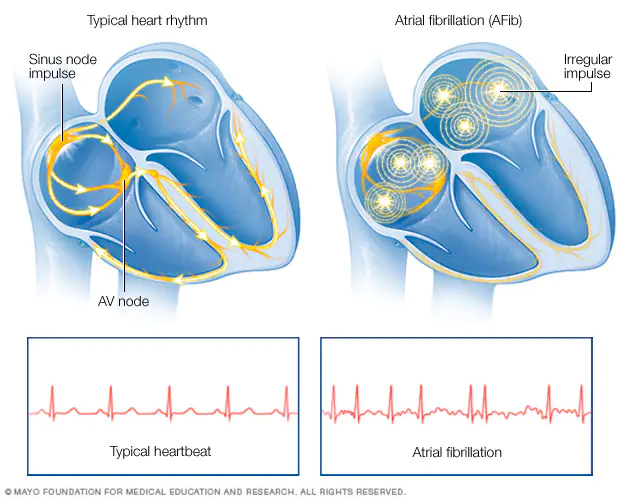What are the Causes and Treatment of Atrial Fibrillation?

Atrial fibrillation (AFib) is a prevalent heart condition marked by an irregular and often rapid heart rate, impacting around 33.5 million individuals globally. This disorder significantly elevates the risk of stroke and heart failure, with a notable impact on mortality rates, especially among older adults and those with preexisting health issues.
In exploring AFib, we delve into its causes and effective management strategies. Understanding these aspects is crucial for early detection, comprehensive treatment, and enhancing the quality of life for individuals with this condition.
What is Atrial Fibrillation?
Atrial fibrillation (AFib) is a common heart rhythm disorder characterized by irregular and often rapid heartbeats. In AFib, the heart’s upper chambers (atria) beat irregularly instead of effectively pumping blood into the lower chambers (ventricles). This can lead to palpitations, shortness of breath, and fatigue.
AFib increases the risk of stroke, heart failure, and other heart-related complications. Treatment aims to control the heart rate, restore normal heart rhythm, and reduce the risk of complications.
“As a cardiologist, I often explain to my patients that atrial fibrillation is a common heart rhythm disorder that requires careful management. Understanding the causes and risk factors, such as age and underlying heart conditions, is essential to effectively treating and preventing complications like stroke. By working together to control symptoms and reduce risks, we can improve the quality of life for those living with AFib,” says Dr. Dinesh Mittal.
What Are the Causes of Atrial Fibrillation?
Causes of atrial fibrillation include:
- Age: The risk of developing AFib increases with age, particularly after the age of 60.
- High Blood Pressure: Hypertension is a significant risk factor for AFib as it can lead to heart structure changes.
- Heart Diseases: Conditions such as coronary artery disease, heart valve disorders, and congenital heart defects can increase the risk of atrial fibrillation.
- Obesity: Being overweight or obese can put added strain on the heart, increasing the likelihood of developing AFib.
- Sleep Apnea: This sleep disorder, characterized by pauses in breathing during sleep, is associated with an increased risk of AFib.
- Other Chronic Conditions: Chronic conditions such as diabetes, thyroid disorders, and chronic kidney disease can contribute to the development of atrial fibrillation.
- Alcohol Consumption: Excessive alcohol intake can trigger episodes of AFib in some individuals.
- Stress and Fatigue: Emotional stress and fatigue can also contribute to the onset of atrial fibrillation.
Dr Mittal explains, “These factors can lead to changes in the heart’s structure and electrical system, disrupting its normal rhythm.”
How can Atrial Fibrillation be Managed?
While atrial fibrillation is a severe condition, it can be effectively managed with the proper treatment approach. Treatment strategies may include:
- Medications: Antiarrhythmic medications and blood thinners may be prescribed to help control heart rate and reduce the risk of stroke.
- Cardioversion: This procedure restores a normal heart rhythm in individuals with atrial fibrillation.
- Ablation Therapy: Ablation therapy involves using catheters to destroy areas of heart tissue, causing irregular electrical signals.
- Lifestyle Changes: Adopting a heart-healthy lifestyle, including regular exercise, a balanced diet, and avoiding excessive alcohol consumption, can help manage atrial fibrillation.
- Monitoring: Regular heart rhythm and blood pressure monitoring are essential for managing atrial fibrillation effectively.
“I was diagnosed with atrial fibrillation last year and was quite scared about what it meant for my health. Dr. Mittal explained everything in detail and reassured me I could lead a normal life with proper management. Thanks to his guidance and the prescribed treatment plan, my symptoms are under control, and I feel much better.” – Rajesh Kumar.
“I have been living with atrial fibrillation for several years now, and it was challenging to manage at first. However, with the help of Dr. Mittal and his team, I have learned how to make lifestyle changes and take my medications regularly. I feel more confident about managing my condition and am grateful for my support.” – Sunita Sharma.
What is the Cost of Treating Atrial Fibrillation in India?
The cost of treating atrial fibrillation (AFib) in India can vary depending on several factors, including the hospital, the specific treatment required, and the patient’s overall health condition. However, here is a general estimate:
| Treatment | Cost Range (INR) | Cost Range (USD) |
| Medications | 500 – 2000 | 7 – 28 |
| Cardioversion | 10,000 – 50,000 | 140 – 700 |
| Ablation Therapy | 1,00,000 – 3,00,000 | 1400 – 4200 |
| Implantable Cardioverter Defibrillator (ICD) | 2,00,000 – 5,00,000 | 2800 – 7000 |
Conclusion
Atrial fibrillation is a common heart condition with significant health implications. Understanding the causes and risk factors associated with AFib is crucial for early detection and management. By adopting a proactive approach to heart health and working closely with healthcare providers, individuals with atrial fibrillation can effectively manage their condition and reduce the risk of complications.
FAQs
1. Can atrial fibrillation be cured?
Atrial fibrillation is a chronic condition that can be managed but not cured. Treatment aims to control symptoms and reduce the risk of complications.
2. Is atrial fibrillation life-threatening?
While atrial fibrillation itself is not usually life-threatening, it can lead to severe complications such as stroke and heart failure if left untreated.
3. Can I exercise with atrial fibrillation?
Regular, moderate exercise is generally safe and beneficial for individuals with atrial fibrillation. However, it’s essential to consult with your healthcare provider before starting any new exercise program.
4. Is atrial fibrillation hereditary?
Atrial fibrillation can have a genetic component, meaning it may run in families. However, lifestyle factors also play a significant role in its development.
5. Can stress trigger atrial fibrillation?
Yes, emotional stress and fatigue can trigger episodes of atrial fibrillation in some individuals. Managing stress through relaxation techniques and stress-reducing activities may help reduce the frequency of episodes.
Explore more blogs: What Are the Best Treatments for Emphysema?
